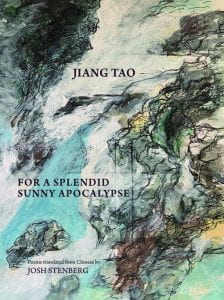MCLC Resource Center is pleased to announce publication of Paul Bevan’s introduction to and translation of “Paris in the Springtime,” by Shao Xunmei. This translation appears in conjunction with the recent publication of One Man Talking: Selected Essays of Shao Xunmei, 1929-1939, translated by Paul Bevan and Susan Daruvala. A teaser appears below. For the full introduction and translation, see: https://u.osu.edu/mclc/online-series/paris-in-the-springtime/.
Kirk Denton, MCLC
By Shao Xunmei 邵洵美
Translated by Paul Bevan
MCLC Resource Center Publication (Copyright September 2023)
Introduction: Shao Xunmei, a Chinese Poet in 1920s Paris
By Paul Bevan

Portrait of Shao by the artist Xu Beihong 徐悲鴻.
Shao Xunmei (1906-68) was a poet, essayist, and publisher. Today, he is best known for his poetry, which mostly belongs to the period when he was a young man in his twenties inspired by the Decadent poets of nineteenth-century Europe. His lesser-known essays, written during the 1920s, 1930s, and 1940s, cover all sorts of different topics, from the poetry of Sappho to the art of the woodblock print, from Shanghai in wartime to Chinese philately. Arguably his greatest contribution to the culture of the Chinese Republican Era (1912-49) was in publishing. During the 1920s and 1930s, Shao Xunmei published an array of pictorial magazines, so important that they did nothing less than define the era, in their celebration of the unique culture that developed in China’s most cosmopolitan city, Shanghai, at a time of great change. In addition to his own magazines, Shao was also responsible for the publication of many other periodicals, in his capacity as printer and editor. The essays translated in the book One Man Talking were all published in Shao’s own magazines between the years 1929 and 1939, and give a good idea of the breadth of his interests.
This short prose piece, “Paris in the Springtime” 巴黎的春天 (which does not appear in the book and was translated specially for MCLC), was published in 1929, three years after Shao Xunmei returned from Europe to China. It describes his movements whilst in Paris on a brief visit from Cambridge, where he was studying towards the university entrance exams. The cover of the book One Man Talking shows a portrait of Shao taken in a Parisian photographic studio in 1926, which was almost certainly posed for at the time of this visit. It has a handwritten greeting in Chinese to his friends and landlords in Cambridge, Rev. A.C. Moule and his wife, and was sent to them from Paris.[1]

Cover of One Man Talking.
In Shao’s poetic introduction the sun drips like honey; the warm breeze has audible footsteps; the tree is female, and she expresses herself in a variety of different ways, depending on who passes beneath her vast green canopy of leaves and branches.
Shao was a young man of his time, and in his writing we sometimes find references to women that do not read well today. This short essay is no exception. The tree giggles when young women pass beneath it, but is dismissive of middle-aged women because they are no longer young. Shao’s description of the artists’ model, though brief, typically objectifies the sitter, and the naïve, even childish ending to the essay brings in the rather self-conscious and unimaginative reference to the “amorous feelings of spring.” Despite these shortcomings, the essay as a whole displays much charm, and is written in a style that is typical of his writings of the time, with a nod towards the use of a descriptive language that shows his poetic aspirations. Above all, the essay provides an excellent indication as to what Shao Xunmei’s pastimes were during the time he spent in Paris as a man of leisure. It also gives an impression of his interests more broadly, interests with which he was able to fully indulge himself while he lived in Cambridge. [READ THE FULL PIECE HERE]
 On Wed 9/27 (3-4:30 EDT), Professor Mark Bender of Ohio State University will have a short discussion with Robin Visser about her new book, Questioning Borders: Ecoliteratures of China and Taiwan (Columbia UP, 2023), followed by audience questions. Register here: https://carolinaasiacenter.unc.edu/event/visser-book-launch/
On Wed 9/27 (3-4:30 EDT), Professor Mark Bender of Ohio State University will have a short discussion with Robin Visser about her new book, Questioning Borders: Ecoliteratures of China and Taiwan (Columbia UP, 2023), followed by audience questions. Register here: https://carolinaasiacenter.unc.edu/event/visser-book-launch/ NEW PUBLICATION
NEW PUBLICATION












